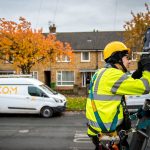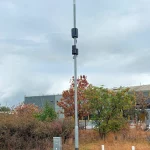Vodafone and Three UK Update on Progress of Joint Network Sharing

Mobile operator VodafoneThree (Vodafone and Three UK) has provided a progress update on their work to implement a new Multi-Operator Core Network (MOCN), which is one of the first big benefits of the recent merger (here and here) – allowing 27 million customers to roam across both networks at no extra cost (whichever one provides the best signal in your location).
Back in June 2025 we noted that the first 24 mast sites had already gone live with this roaming feature (here), but we also highlighted how it would take a total of 8 years to fully complete the roll-out (it will be 95% complete after 6 years). The deployment is thus initially being strategically focused on areas of the country that will gain the most benefit from it (i.e. those with a poor 4G or 5G signal from one or the other operator).
The latest progress update reveals that the feature has now gone live via a total of 600 mast sites, with 9,000 to follow by the end of the first year of VodafoneThree being formed (March 2026 still seems to be the target for this). Meanwhile, some 7 million Three UK customers are already said to be experiencing an average 20% boost in 4G (mobile broadband) speeds, rising to 40% in some key towns and cities, thanks to the integration of combined spectrum. But substantiating the latter claim remains incredibly difficult.
Advertisement
Progress Update
Together, these network improvements reflect the rapid pace at which VodafoneThree is transforming connectivity across the UK. All customers of VodafoneThree brands will see benefits within 12-months.
➤ Peak period improvements – Busy times, such as rush hour, put a strain on the network, as sites can be flooded with more customers than they can provide a good quality service to. Thanks to the technology, customers will be moved from a busy site to one that is able to provide the required level of performance. It also simultaneously relieves the strain on the busy site, providing a better experience for all customers.
➤ Eliminating 4G not spots – By providing 4G coverage to 16,500km of the UK where it wasn’t previously available to either brand’s customers, VodafoneThree will eliminate not spots across an area ten times the size of London.
➤ Enhanced 5G coverage – Around 71% of the UK population (circa 50 million) will have access to VodafoneThree’s fastest 5G speeds by the end of year one, thanks to bringing the networks together and an accelerated 5G roll out plan.
We should remind readers that users of the latest 5G Standalone (5G SA) services (i.e. a pure end-to-end 5G only network) will have to wait a bit longer as these are not yet able to support the new roaming ability, and it’s unclear when that will change. Over the longer term, VodafoneThree will ultimately need to move beyond MOCN and deliver a single core network, but that’s another thing that’s still “many years away“.
Andrea Donà, Chief Network Officer, VodafoneThree, said:
“Bringing our networks together marks a major milestone for VodafoneThree, unlocking greater capacity, reducing 4G not spots, and expanding 5G coverage. Just weeks into the rollout, millions of customers are already seeing the benefits of a nationwide boost, powered by our spectrum integration and Multi-Operator Core Network technology. It’s a clear signal of VodafoneThree’s ambition and ability to move at pace to deliver a new era of connectivity.”
At this point it’s worth remembering that the merged company ultimately aims to reach 99.95% UK population coverage of their 5G Standalone (5G SA) network by 2034, while also pushing fixed wireless access (mobile home broadband) to 82% of households by 2030.
Mark is a professional technology writer, IT consultant and computer engineer from Dorset (England), he also founded ISPreview in 1999 and enjoys analysing the latest telecoms and broadband developments. Find me on X (Twitter), Mastodon, Facebook, BlueSky, Threads.net and Linkedin.
« O2 UK Issue Progress Update on Removal of Inbound 2G and 3G Roaming





















































How are we able to tell if this is available in our areas? Is this something we can try with cellmapper or some other tool, or is it a case of try it and see?
Ha! I was thinking exactly the same, if there’s a simple way to find out. They’re good at putting all this fluff out there, but don’t bother to inform the customers.
I was wondering the same thing. The press release just says “600 sites” without any indication of which sites or in which areas. I wonder if Three/Vodafone’s coverage maps on the website will take the shared signal into account?
They will be in London. EVERYTHING benefit always seems to be, at the cost of the rest of the country.
You can look at the bands the phone is using. If a Three customer is connected to B8 or B7, then it’s using a Vodafone mast because Three never had those bands. If a Vodafone customer is using B28 or just 5MHz of B20, then they’re using a Three mast.
Eventually Vodafone will start “rebuilding” sites and deploying the new combined spectrum, but for now looking at bands work fine.
Three are sending out texts to customers when they’re in an area where a new site has gone live.
How does this actually work though in practice – what if you have a really good Vodafone signal, and a lower band say 28 5G on Three.
Is the Vodafone signal going to counteract the Three 5G because it’s stronger, knocking you back to a lower speed 4G?
You’re overlooking the fact the 4G may perform better than the n28 5G so moving to the stronger; more reliable bandwidth will work in your favour.
We survived with 4G for many years, and given the bandwidth trade from Vodafone to Three, improvements are already apparent.
People are hooked on the misleading marketing that 5G is the best, which it is in very few circumstances (outside of the mast usually).
In other circumstances, 4G can top 5G performance easily, especially n28.
Carlo, Wouldn’t the n28 band offer lower latency than 4G though? In the end a low latency would give most applications like VPN, web browsing a boost from a user perspective.
The network’s Mobility Management Entity still controls which signal you use; in MOCN like this (as opposed to national roaming), you’re using your home network’s MME at all times, and it can move you between cells as it sees fit.
So, if there’s a good Vodafone signal, and a weaker (but faster) Three signal, your network’s MME can move you to the Vodafone signal when parked (to keep power consumption down when you check in and confirm you’re still present), and to the Three signal when you’re actively using data.
Three still seem dreadful in central London with no seeming change.
I haven’t seen any MOCN in central London, so I guess that’s to be expected.
From first hand experience (got a text to say they completed some work) I can tell you that this has significantly improved my mobile signal for both calls and data, before this was carried out, I struggled with 1 bar on three and data barely worked, since the work I now have 5g and pretty much full signal at home now.
It’s still gonna take years so I’m not holding my breath.
Is this work requiring any physical changes at base stations or is it all remote config for now?
My town is suffering from a joint Three / EE outage and has been for over 2 weeks now and I’m wondering if it’s to do with Vodafone Three changing things.
EE’s 4G & 5G kit will be physically different from 3UK.
Looking at the coverage plans for both Three and Vodafone in Cornwall, it’s interesting to note that Voda, which currently has one 5g mast in the county, is expecting to add 5G & 5G Ultra [SA?] to all the same areas that Three already has over the next 3 months.
Interested to see if that’ll be roaming, as I have both sims for home and work.
While everyone has bashed Three over the years, I was always very smug that their data still worked very well in the summer, whilst you couldn’t make a call on Voda.
I fear that Voda’s awful capacity will see their customers swamp Three’s, and the latter will become just as unusable in holiday periods.
There was nothing wrong with Smarty until Vodarubbish got in on the act, now my brother is having all sorts of problems.
I axed my 2nd phone contract last year that was on Vodafone. I’ve been with Three for a very long time [from around 2006] over the last six years their 4G & 5G coverage and speeds have improved a lot around south wales into west wales with their aggressive 5G rollout & 4G expansion.
I always have a better data experience on Three than Vodafone, when driving around. Especially in Cardiff.
Their coverage is excellent in a lot more places. It’s a shame that eventually we’ll lose Three completely. We can all see Vodafone taking charge.
Will these promised network benefits also apply to MVNOs like Lebara when they roll out?
Read the article and your question will be answered.
I can’t wait to see the back of these useless money grabbing terrestrial networks in favour of 4G/5G being delivered via satellite, it may take a while but it’s certainly the way forward.
the satellite operators are reliant on the “money grabbing” terrestrial operators to provide everything else, and can’t provide anywhere near the kind of performance that a terrestrial network can provide. not to mention that it won’t work in buildings. It isn’t clear how they’re going to overcome the laws of physics to change this.
If any sat firm did attempt to go it alone, do you think they’d somehow be cheaper than what we have now?
unclear what your gripe is really. I don’t pay a lot for my service and it works fine. Do the sat firms never put their prices up? Starlink has multiple times – gotta pay for those thousands of satellites somehow
My phone cuts off every other week once for 2 days no compensation nothing with 3 network I’m leaving at end of contract
Utter shit coverage since merger hands above head syndrome now.
coverage brilliant before now utter rubbish don’t ever join any of the 2
Expectations confounded – NW London has yet been awarded the golden salva.
Tried Smarty on a stand alone mobile modem. During peak evening usage, the best I could get on a Windows 11 desktop was 6 Mbps down and about the same up. Something’s not right there.
Good enough for a single user doing uninterrupted, fluid, e-mail, web-browsing and occasion video streaming.
But GG can get near on 49Mbps down and 10 up.
Guess where I’ll be going when the land-line gets ditched
Do / will customers with Lebara benefit from the Three/VF joint network sharing?
Reception on Smarty into Central London from Sudbury Town following the Picadilly line underground track has been much worse since the merger improvement announcements.
Smarty is fantastic in Slough still.
3 was the best 5g data in NW London for sure before the merger. In my opinion
Everyone i speak is complaining of worse off network experiences overall
Article notes “VOXI, Talkmobile and Smarty” can now all use Vodafone and 3 masts now (well, the ones it has been enabled on, anyway)… but will this mast-sharing also be offered to customers of Asda Mobile and Lebara (on Vodafone), and iD Mobile and Superdrug Mobile (on 3)?
Or is it possible some MVNO customers of either former standalone parent won’t get to share masts?